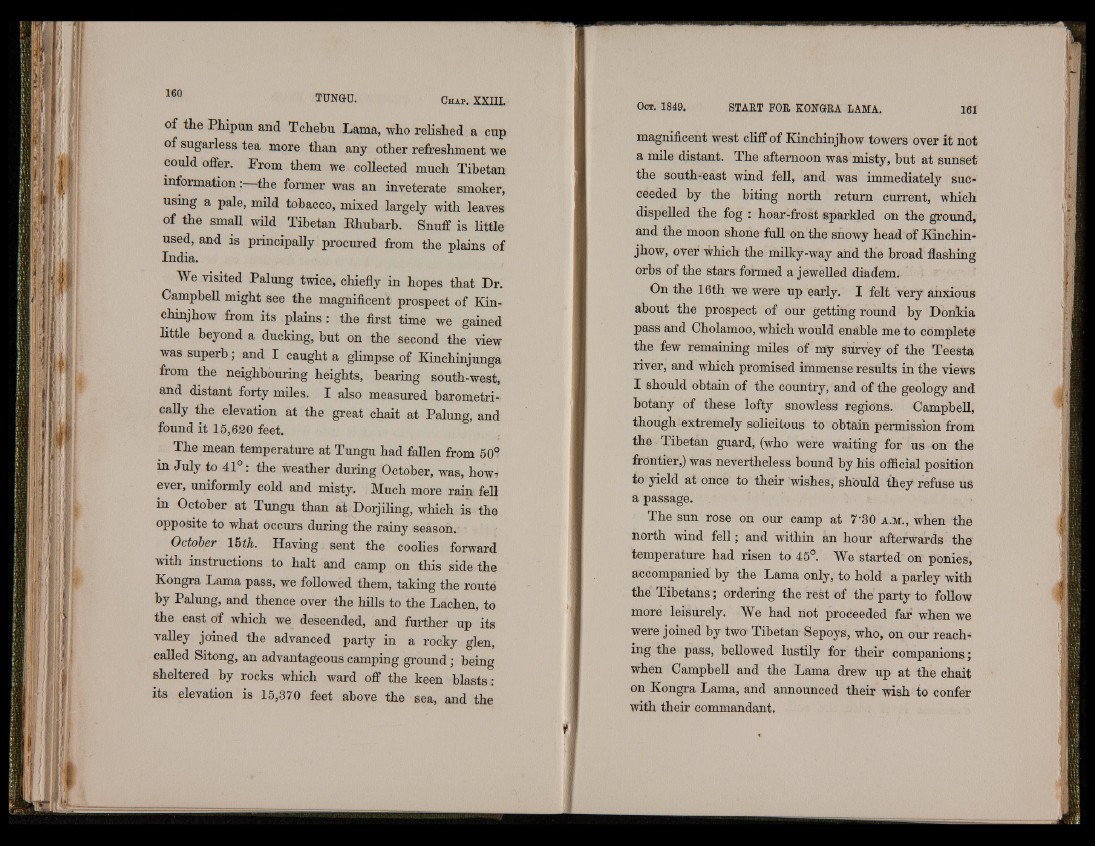
of the Phipun and Tchebu Lama, who relished a cup
of sugarless tea more than any other refreshment we
could offer. From them we collected much Tibetan
in f o rm a tio n th e former was an inveterate smoker,
using a pale, mild tobacco, mixed largely with leaves
of the small wild Tibetan Bhubarb. Snuff is little
used, and is principally procured from the plains of
India.
We visited Palung twice, chiefly in hopes that Dr.
Campbell might see the magnificent prospect of Kin-
chinjhow from its plains : the first time we gained
little beyond a ducking, but on the second the view
was superb; and I caught a glimpse of Kinchinjunga
from the neighbouring heights, bearing south-west,
and distant forty miles. I also measured barometrically
the elevation at the great chait at Palung, and
found it 15,620 feet.
The mean temperature at Tungu had fallen from 50°
in July to 41°: the weather during October, was, how,
ever, uniformly cold and misty. Much more rain fell
in October at Tungu than at Dorjiling, which is the
opposite to what occurs during the rainy season.
October 15th. Having sent the coolies forward
with instructions to halt and camp on this side the
Kongra Lama pass, we followed them, taking the route
by Palung, and thence over the hills to the Lachen, to
the east of which we descended, and further up its
valley joined the advanced party in a rocky glen,
called Sitong, an advantageous camping ground; being
sheltered by rocks which ward off the keen blasts:
its elevation is 15,370 feet above the sea, and the
magnificent west cliff of Kinchinjhow towers over it not
a mile distant. The afternoon was misty, but at sunset
the south-east wind fell, and was immediately succeeded
by the biting north return current, which
dispelled the fog : hoar-frost sparkled on the ground,
and the moon shone full on the snowy head of Kinchinjhow,
over which the milky-way and the broad flashing
orbs of the stars formed a jewelled diadem.
On the 16th we were up early. I felt very anxious
about the prospect of our getting round by Donkia
pass and Cholamoo, which would enable me to complete
the few remaining miles of my Survey of the Teesta
river, and which promised immense results in the views
I should obtain of the country, and of the geology and
botany of these lofty snowless regions. Campbell,
though extremely solicitous to obtain permission from
the Tibetan guard, (who were waiting for us on the
frontier,) was nevertheless bound by his official position
to yield at once to their wishes, should they refuse us
a passage. >
The sun rose on our camp at 7'30 a.m., when the
north wind fell; and within an hour afterwards the
temperature had risen to 45°. We started on ponies,
accompanied by the Lama only, to hold a parley with
the Tibetans ; ordering the rest of the party to follow
more leisurely. We had not proceeded far when we
were joined by two Tibetan Sepoys, who, on our reaching
the pass, bellowed lustily for their companions;
when Campbell and the Lama drew up at the chait
on Kongra Lama, and announced their wish to confer
with their commandant.